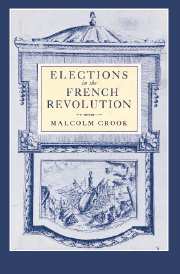Book contents
- Frontmatter
- Contents
- List of maps
- List of tables
- Acknowledgements
- List of abbreviations
- Introduction
- 1 Subjects to citizens? The elections to the Estates General and the Revolution
- 2 Limits of citizenship: The franchise question, 1789–1791
- 3 Biting on the ballot: From enthusiasm to abstention, 1790–1791
- 4 One man one vote? The experiment with electoral democracy in 1792
- 5 Voting the Constitution: The referenda of 1793 and 1795
- 6 Parties, schisms and purges: Elections under the Directory, 1795–1799
- 7 An invisible aristocracy? The departmental assemblies and the emergence of a new political class
- Conclusion
- Bibliography
- Index
1 - Subjects to citizens? The elections to the Estates General and the Revolution
Published online by Cambridge University Press: 03 November 2009
- Frontmatter
- Contents
- List of maps
- List of tables
- Acknowledgements
- List of abbreviations
- Introduction
- 1 Subjects to citizens? The elections to the Estates General and the Revolution
- 2 Limits of citizenship: The franchise question, 1789–1791
- 3 Biting on the ballot: From enthusiasm to abstention, 1790–1791
- 4 One man one vote? The experiment with electoral democracy in 1792
- 5 Voting the Constitution: The referenda of 1793 and 1795
- 6 Parties, schisms and purges: Elections under the Directory, 1795–1799
- 7 An invisible aristocracy? The departmental assemblies and the emergence of a new political class
- Conclusion
- Bibliography
- Index
Summary
The cahiers de doléances, or lists of grievances, drafted in the towns and villages of France during the spring of 1789, have attracted a great deal of attention from historians, unlike the elections to the Estates General which accompanied them. Yet these elections were of great moment, not only because they mobilised the French people in an unprecedented fashion and created the first generation of revolutionary leaders, but also on account of their legacy to the electoral practice and procedure of the Revolution itself. This has rarely been recognised, since the last Estates General met for only two months before it was transformed into a National Assembly and consigned to the past. Contemporaries were naturally loath to acknowledge any influence of the old régime upon the new and sedulously cultivated the myth of the Revolution as a fresh start. In fact, there was a strong electoral tradition to draw upon for, even during the age of absolutism, elections had persisted at the local, if not central level. A careful study of the poll of 1789 helps to demonstrate the extent to which, in the words of François Furet, ‘the ancien régime influenced the Revolution via the Estates General’.
In the first place, the franchise for the final Estates General provoked disagreements which anticipated the famous suffrage debate of succeeding years. The three orders might continue to meet separately, in time-honoured fashion, but all tax-payers were given the vote. Many of them used it, though there were considerable variations in turnout from one community to another.
- Type
- Chapter
- Information
- Elections in the French RevolutionAn Apprenticeship in Democracy, 1789–1799, pp. 8 - 29Publisher: Cambridge University PressPrint publication year: 1996



